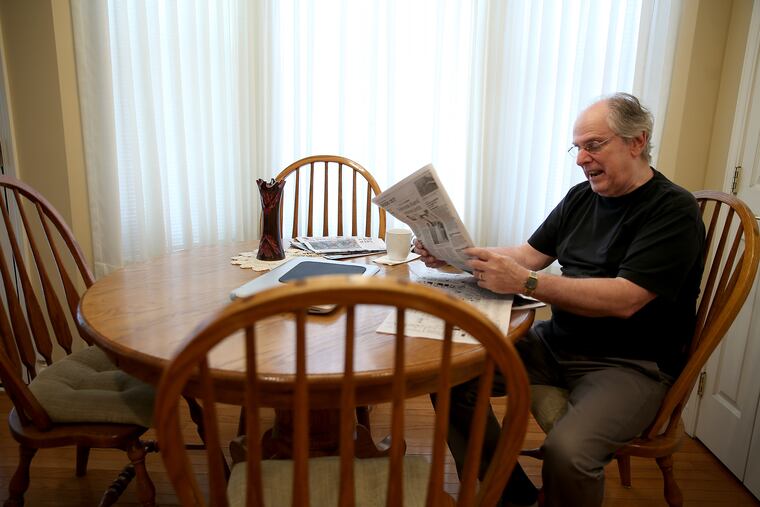This Jersey dad called my phone in Conshohocken. He left me thinking that tech is dividing us, and stripping us of empathy, too | Maria Panaritis
This New Jersey man made a living spreading the gospel of digital technology for decades. Now, he's worried it may be dividing us as a nation. Here is his conversation with Philadelphia Inquirer columnist Maria Panaritis.

"Call me Tony."
This is how Anthony DeVirgilis asked to be greeted when a photographer and I got to the front door of his South Jersey home Friday morning. This was a man who had left a message on my office phone in Conshohocken a few weeks back referring to himself as "Anthony." A man who, after reading a column of mine about clergy abuse across six Catholic dioceses in Pennsylvania, felt a call was in order.
"We need the printed press, the free press," his voicemail said. "Thank you for doing this."
I had jotted down Anthony's words, marked the time and date, and set aside my scrawl as I do with many messages I receive in any given week. But something about it stuck with me. He had politely hung up, without so much as asking for a call back. A few weeks later, after five newspaper staffers were massacred in a Maryland newsroom, I called Anthony back to say thank you. I then made it to his doorstep across the river in Jersey, refusing to call him Tony.
"Good morning, Anthony," I said, before heading into the meticulous Sicklerville home he shares with his wife, Donata. For four years now, his lifelong love has been confined to a hospital bed and wheelchair, idled by multiple sclerosis. And yet, Donata laughs and laughs and laughs with infectious joy. She is grateful, she says, that her husband, this man Tony, refuses to let her hold a pity party that lasts longer than five minutes.
"Talk to me about solutions," he tells her, tenderly. It has kept Donata going.
No wonder I had wanted to call this man back. In an age of unrepentant anger, here was a good egg. A human being with empathy, patience, and the courage to be compassionate despite the anger all around us in this Age of Trump.
I wondered if he was unique that way, because Anthony, at 71, isn't like a lot of people. He was born when we used pencils at school, had one phone in our houses, and TV was a luxury. But he made a living, with his scientific and open mind, on the frontier of the digital world, selling computer systems to businesses for decades before anyone had even heard of Google.
He went to Drexel for two degrees and peddled computer software and databases long before Russian hacking, Donald Trump's toxic Twitter handle, or Facebook's lust for coaxing users into giving up their privacy in return for posting filtered stories about their supposedly authentic lives on line.
This man knows us as the humans we once were, and he knows us as the captives of technology that we have become. And he is the furthest thing from a Silicon Valley technobot himself, even if you consider his black T-shirt and wire-rimmed glasses.
Anthony is a South Philly kid (22nd and Jackson Streets) and a Bishop Neumann High School grad whose dad worked at the Navy Yard and whose mom was a homemaker.
Anthony married a blue-collar kid, too. Donata is the oldest of three and lost her mom while still very young. Together they raised a daughter.
"Everything in moderation," Anthony still remembers his dad saying, quoting Aristotle.
The extreme views and hatred being spewed by regular folks on social media and at family gatherings, he worries, are being facilitated by technology. He worries that the revolution he helped push may now be, in no small way, doing us all in.
Careless citizens are being manipulated because they don't read papers. Because they're not paying attention to what is real. Because they are indulging base anger and biases, with the cloak of social media as cover.
"I think it's going to get worse before it gets better," Anthony said. "People are going to use technology not for the good. The pendulum always swings back; what I'm worried about is I don't know when."
Anthony waits for a nurse to arrive every morning to help his wife. That's his window of "me time," when he makes a bowl of oatmeal or cereal, pours a cup of coffee, and opens the paper to the funnies, then the news, and ends with sports.
"I sit down, I have my coffee, my cereal, and I read my paper cover to cover, all the way through," he said. "Then I get my laptop, open it up, read my emails, look at certain articles that are online. I will get onto Facebook — and get pretty annoyed."
He wonders, as do I, if what we really need is to walk away from all this noise. To rediscover our humanity as social beings.
"What would happen to the country," he asks "if we had 24 hours of shutting down technology? Shut your phone off, shut your laptop off, shut your tablet off."
The kitchen goes quiet as we ponder that. It sounds glorious — the idea and the stillness of that moment.
"I would love to see that," Anthony says.